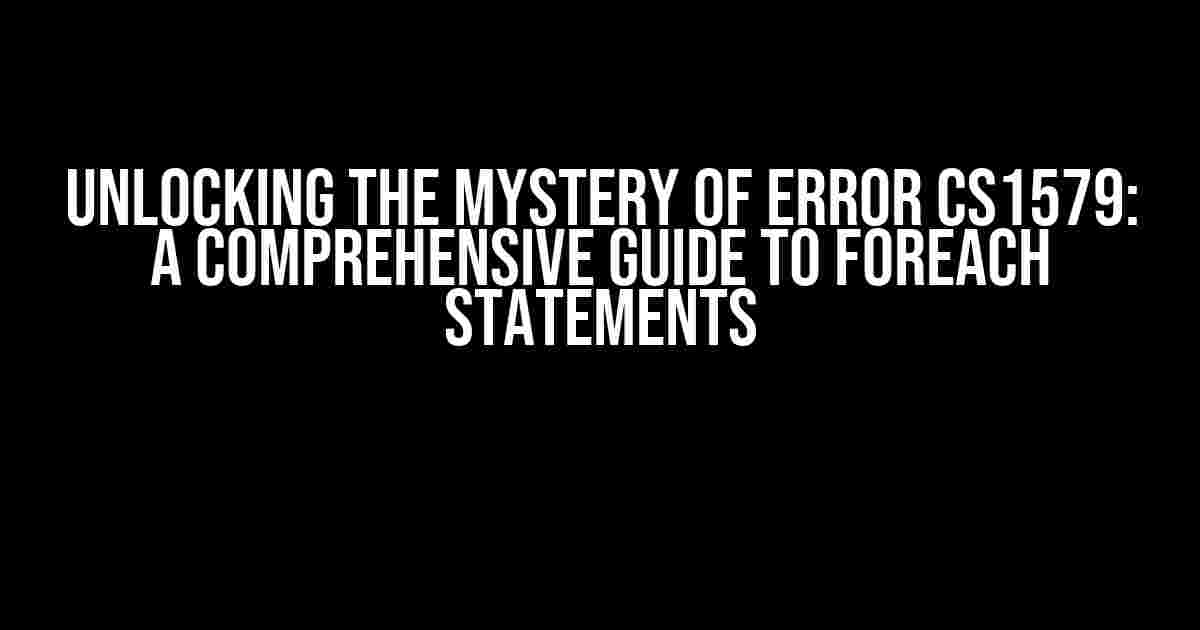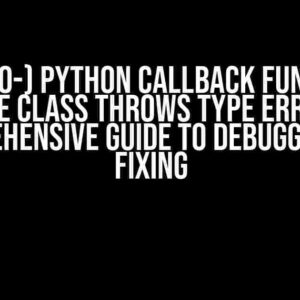Are you tired of encountering the frustrating Error CS1579, wondering why your foreach statement won’t cooperate? Fear not, dear developer! This article is here to enlighten you on the intricacies of foreach statements and provide you with actionable solutions to overcome this common hurdle.
What is Error CS1579?
Error CS1579 is a compiler error that occurs when you attempt to use a foreach statement on a variable that is not an array or a collection. This error is often encountered by developers who are new to C# or are transitioning from other programming languages. The error message typically reads:
foreach statement cannot operate on variables of type '{type}' because '{type}' does not contain a public instance definition for 'GetEnumerator'
This error is telling you that the variable you’re trying to iterate over doesn’t have a GetEnumerator method, which is required for the foreach statement to function.
Why Does Error CS1579 Occur?
Error CS1579 can occur due to various reasons, including:
- Using a foreach statement on a single object or value type
- Attempting to iterate over a null or uninitialized collection
- Using a foreach statement on an object that doesn’t implement the IEnumerable interface
These mistakes can be avoidable with a better understanding of how foreach statements work and the types that are compatible with them.
Understanding foreach Statements
A foreach statement is used to iterate over a collection of objects, such as arrays, lists, or other types that implement the IEnumerable interface. The foreach statement allows you to access each element in the collection without having to worry about the underlying indexing or iteration logic.
The Anatomy of a foreach Statement
A typical foreach statement consists of the following components:
foreach (type variable in collection)
{
// code to execute for each iteration
}
In this syntax:
typespecifies the data type of the variablevariableis the name given to the iteration variableinis the keyword that separates the iteration variable from the collectioncollectionis the object being iterated over
Common Scenarios That Trigger Error CS1579
Let’s explore some common scenarios that can lead to Error CS1579:
Scenario 1: Using a foreach Statement on a Single Object
int x = 5;
foreach (int y in x)
{
Console.WriteLine(y);
}
In this example, the foreach statement is trying to iterate over a single integer value, which is not a collection. This will result in Error CS1579.
Scenario 2: Attempting to Iterate Over a null or Uninitialized Collection
List<string> colors = null;
foreach (string color in colors)
{
Console.WriteLine(color);
}
In this scenario, the collection is null, and the foreach statement will throw Error CS1579.
Scenario 3: Using a foreach Statement on an Object That Doesn’t Implement IEnumerable
object obj = new object();
foreach (object item in obj)
{
Console.WriteLine(item);
}
In this example, the object type doesn’t implement the IEnumerable interface, which is required for the foreach statement to work. This will result in Error CS1579.
Solutions to Error CS1579
Now that we’ve explored the common scenarios that trigger Error CS1579, let’s dive into the solutions:
Solution 1: Use a foreach Statement on a Compatible Type
int[] numbers = { 1, 2, 3, 4, 5 };
foreach (int number in numbers)
{
Console.WriteLine(number);
}
In this example, we’re using a foreach statement on an array, which is a compatible type.
Solution 2: Initialize and Populate the Collection Before Iterating
List<string> colors = new List<string> { "Red", "Green", "Blue" };
foreach (string color in colors)
{
Console.WriteLine(color);
}
Here, we’re initializing and populating the collection before using the foreach statement.
Solution 3: Use the as or is Keywords to Check for IEnumerable
object obj = new List<string> { "Apple", "Banana", "Cherry" };
if (obj is IEnumerable)
{
foreach (object item in (IEnumerable)obj)
{
Console.WriteLine(item);
}
}
In this scenario, we’re using the is keyword to check if the object implements the IEnumerable interface before attempting to iterate over it.
Bonus Tips and Best Practices
To avoid Error CS1579 and ensure smooth iteration, follow these bonus tips and best practices:
- Use the var keyword to let the compiler infer the type of the iteration variable
- Avoid using foreach statements on null or uninitialized collections
- Use the as or is keywords to check for IEnumerable before iterating
- Use arrays or collections that implement IEnumerable for foreach statements
- Use a for loop or other iteration methods when working with non-collection types
| Type | Compatible with foreach |
|---|---|
| Array | |
| List<T> | |
| IEnumerable | |
| IQueryable | |
| object | X |
| Single Object | X |
By following these guidelines and understanding the intricacies of foreach statements, you’ll be well-equipped to tackle Error CS1579 and write more effective, efficient code.
Conclusion
Error CS1579 may seem like a daunting obstacle, but with a solid understanding of foreach statements and the types that are compatible with them, you’ll be able to overcome this hurdle and write robust, error-free code. Remember to use compatible types, initialize and populate collections before iterating, and use the as or is keywords to check for IEnumerable. By following these best practices, you’ll be well on your way to becoming a master of C# programming.
Frequently Asked Questions
Get the inside scoop on error CS1579 and how to tackle it like a pro!
What does error CS1579 mean, and why does it occur?
Error CS1579 is a common error in C# that occurs when the foreach statement is used on a variable that doesn’t implement the IEnumerable interface. This error can happen when you’re trying to iterate over a collection that doesn’t support iteration. For instance, if you’re trying to loop through a single object or a null value using foreach, you’ll get this error.
How do I resolve error CS1579?
To resolve error CS1579, you need to ensure that the variable you’re trying to iterate over implements the IEnumerable interface. Check if your variable is a collection or an array, and make sure it’s not null. If you’re working with a single object, use a different approach, like accessing its properties directly. Additionally, verify that you’re using the correct syntax for the foreach loop.
What are some common scenarios where error CS1579 might occur?
Error CS1579 can occur in various scenarios, such as when you’re working with databases and trying to iterate over a single row or a null result set. It can also happen when you’re working with APIs that return a single object or a null response. Another common scenario is when you forget to initialize a collection or array, leading to a null reference error.
How can I prevent error CS1579 from happening in the first place?
To prevent error CS1579, always validate your variables and ensure they’re not null before attempting to iterate over them. Use null checks, and consider using the null-conditional operator (?.) to avoid null reference exceptions. Additionally, make sure you’re using the correct data type and that your collections or arrays are properly initialized.
Can I use a different loop type to avoid error CS1579?
Yes, if you’re working with a single object or a small collection, you can use a different loop type, such as a for loop or a while loop, to iterate over the object’s properties or the collection’s elements. However, if you’re working with a large collection, using a foreach loop is usually the most efficient and readable approach.



